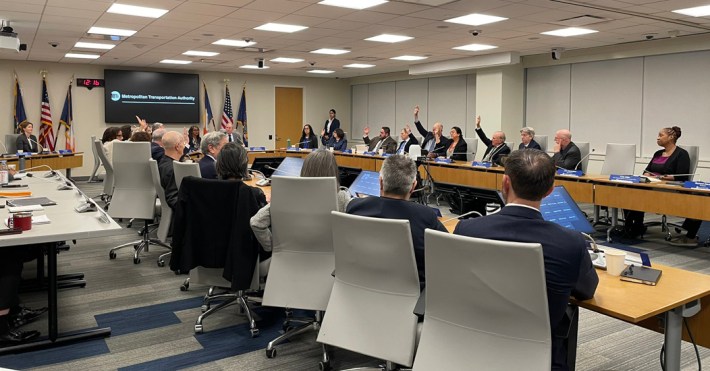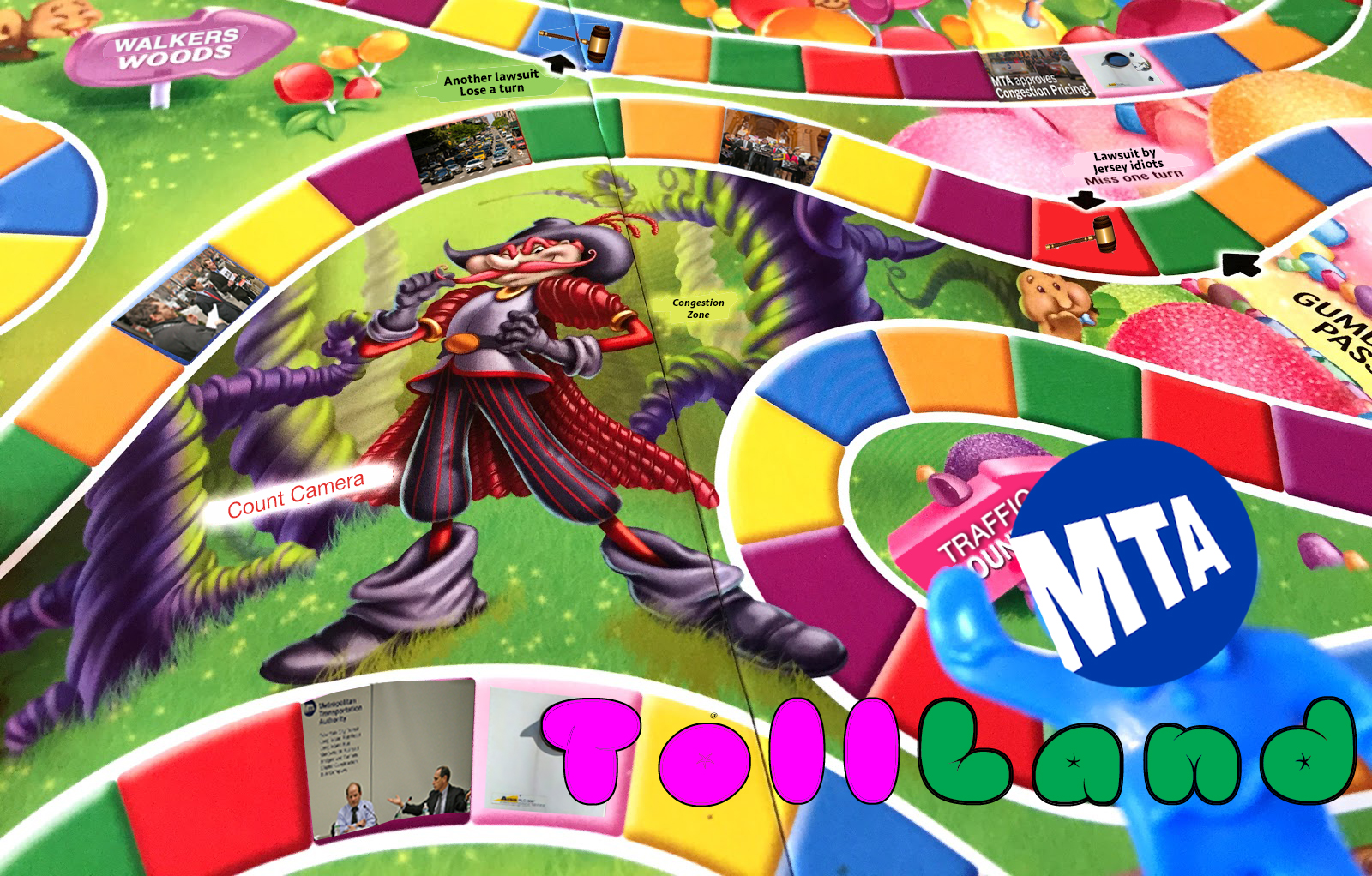New York City's congestion pricing tolls are one historic step closer to reality after Wednesday's 11-1 MTA board vote in favor of the state's proposed pricing structure for the program — with only pesky lawsuits standing in the way of the traffic reduction scheme's planned mid-June launch.
The MTA must now prevail in court where it faces a number of legal attempts to kick the program back into environmental study Hell. A suit from New Jersey is scheduled for oral arguments next week. An additional three suits from New York City-based opponents of the toll have been consolidated into one case that MTA hopes to get dismissed at its next hearing on May 17. More litigation could be coming — Rockland County filed its own suit on Wednesday, and several opponents vowed after the historic vote to "see the MTA in court."
Whatever the future holds, the board put a historic cap on a half century of attempts to tame lower Manhattan's awful traffic with tolls on auto trips — paving the way for the MTA to charge $15 to drive into the Central Business District below 60th Street between 5 a.m. and 9 p.m. on weekdays, and between 9 a.m. and 9 p.m. on weekends.
After 9 p.m., the toll will cost just $3.75. State law requires the MTA to raise enough money from the new toll in order to borrow $15 billion for its current five-year capital plan.
Board members who voted in favor voiced strong approval of the plan, which took an astounding five years to get to this point after the State Legislature and then-Gov. Andrew Cuomo authorized it in the 2019 budget. The push for pricing dates back even further — making Wednesday's vote the culmination of a debate that began back when to Mayor John Lindsay, who talked about tolling the East River Bridges in 1973.
"This has not been an easy journey, but nothing is more powerful than idea whose time has come," said Midori Valdivia, a board member nominated by Mayor Adams.
Valdivia's remark was perhaps the understatement of the decade.

The long road to road pricing
Lindsay early plan came extremely close to happening before it was kiboshed by Sen. Daniel Patrick Moynihan and Rep. Elizabeth Holtzman in 1977, courtesy of an amendment to the federal Clean Air Act — though that first quashing at least came with money to help repair the city's ailing transit system.
Later transportation leaders made attempts to get mayors to embrace the idea. Former City Traffic Commissioner "Gridlock" Sam Schwartz tried to get Mayor Ed Koch to toll the East River Bridges — which to this day remain free for drivers to cross — but the plan was hounded out of town. Even under Mayor David Dinkins, adviser Janette Sadik-Khan, who later served as Transportation Commissioner under Mayor Mike Bloomberg, pitched the same tolls only to see the idea dismissed by more powerful political leaders in the city.
Bloomberg didn't immediately back the concept of congestion pricing when he took office in 2002. But the three-term mayor has been closely linked to the policy ever since he proposed congestion pricing in 2007. Transit advocates happily backed Bloomberg on the idea — even pitching him on ways he could bring on reluctant outer borough legislators. The proposal still died that year before even coming up for a vote in Albany.
Advocates for the plan never gave up. By 2015, pricing backers in the Move NY Coalition were shopping a plan that would establish a lower Manhattan toll in exchange for reduced tolls on city bridges that didn't connect directly to lower Manhattan. (Elements of that philosophy live on in the State Legislature's use of some anti-congestion fees to fund bridge toll rebates to Bronx, Staten Island and Queens residents.)
But congestion pricing was finally revived in earnest in 2018 by Cuomo — who joined with transit advocates eager to fight traffic and raise money for a strained transit system to actually get the proposal through in 2019.
Cuomo has recently run away from the program — one of his chief accomplishments as governor. Norman Brown, a longtime MTA Board member representing Metro-North workers lamented the disgraced ex-governor's flip-flop — while predicting Cuomo would someday brag about his role making the toll a reality.
"I have a black belt in cynicism and I wanted to thank ex-Gov. Cuomo at some point for pushing this through," said Brown. "In the short term, his support has gone the other way, but I'm hoping that five years from now, Andrew Cuomo is bragging, 'I put this thing in, I drove a stake in heart congestion in Midtown Manhattan.'"
The 2019 legislative go-ahead for congestion pricing faced significant headwinds from outside forces. The MTA needed to get federal approval from the federal Department of Transportation — run by vindictive then-President Donald Trump. Trump's DOT delayed the project — leaving it in a bureaucratic purgatory for a year by refusing to even tell the MTA which type of environmental review was required to win federal approval.
After Trump (eventually) yielded the White House to Joe Biden, the DOT allowed the MTA to do an environmental assessment, the simpler of the two options. Yet even that study took well over a year to finish — and required the MTA to simulate traffic impacts as far away as the Philadelphia suburbs.
The agency finally won federal approval last summer when the Federal Highway Administration gave its assessment a seal of approval with a "Finding of No Significant Impact." The determination meant the toll's potential effects didn't cross any federal thresholds for negative impacts to things like air quality, traffic or the economy.
What it took to get here
Throughout the process, as opponents have sought to characterize the toll as punishment and burden for everyday New Yorkers, transit advocacy organizations whipped support. The MTA's most recent round of public hearings on the toll saw congestion pricing supporters outnumber opponents by an almost 2:1 margin.
One of those advocacy organizations, Riders Alliance, celebrated the vote with a tweet calling congestion pricing "a monumental shift that will be felt by millions of New Yorkers."
Board members themselves also stated the plain fact that New York's working poor rely on the public transit system — not cars — to get to lower Manhattan.
"My organization, the Community Service Society, has been fighting for the needs of the working poor 180 years," said David Jones, a city representative on the MTA Board. "We did two reports, in 2017 and 2022, finding that less than 2 percent of the working poor used cars to get into the Central Business District. That's 5,000 people. This plan is vital for working people, whether they're home attendants, working in hospitals, cleaners, to get to work, and they're the important citizens of New York City."
The MTA has plans to turn on the toll cameras on or around June 15. But Wednesday's vote doesn't end the process leading up to flipping the switch. Per the terms of federal approval, federal officials will have to reevaluate the tolling structure now that it's been approved by the MTA Board to make sure the traffic and air quality impacts don't fall outside what was approved in the EA.
'We'll see you in court'
The anti-toll lawsuits filed so far don't aim to overturn the law that established congestion pricing — but rather to kick the can down the road by requiring the MTA perform an environmental impact statement, a more in-depth study of the impacts of the toll. There's also no telling how many more lawsuits will be filed between now and mid-June.
MTA Chairman and CEO Janno Lieber expressed confidence that the MTA would prevail, referring to reams of data the MTA assembled for its environmental assessment, which experts have compared in depth and breadth to typically more thorough environmental impact statements.
"We did this 4,000-page environmental assessment, a scale of an environmental review process that had never been completed before to my knowledge — not just the the number of pages, but the modeling and the analysis, studying every intersection almost all the way to Philadelphia, and doing a public outreach process that had more than 50 public meetings and 25,000 comments in the last hearing phase," said Lieber.
"Under federal environmental law, an undertaking of that scale is fully compliant and more than exceeds the standards for a proper federal environmental review. And we're confident that we're going in the right direction."
Still, one of the city's most preeminent congestion pricing advocates will be holding his breath until June 15.
"I was delighted to hear of the vote and, just hope the lawsuits can be dismissed," said Schwartz, the city's former Traffic Commissioner who proposed East River bridge tolls under Koch and crafted the Move NY plan.
"I'm not popping the cork on my Champagne bottle yet, but I'm hoping in June we could see it implemented."






